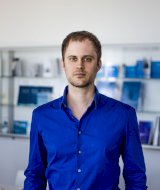
Can you introduce yourself and your current position? How long have you been working there?
My name is Christoph Spang, I’m a senior researcher interested in chronic pain conditions in the musculoskeletal system. I have two masters in neurobiology and sports science from Würzburg University (Germany) and I did my PhD thesis on chronic Achilles tendon pain (tendinopathy) at Umea University (Sweden). Since 2016, I have worked as senior researcher in a private spine clinic and have built up a research team and a strong network with colleagues from the academic and medical world. We are working on innovative conservative treatment methods primarily focusing on specifically reconditioning the paraspinal back muscles. Apart from the science part I also work as a strengthening therapist and see patients two days a week. Furthermore, we are closely connected to a company that translates this knowledge we gain from our studies into the development of innovative medical exercise devices.

What was your major drive to do the transition?
One of my major drives was for sure that I always had many different fields of interests, and I couldn’t see myself specializing in one single field. Also, I was tired of working in the lab. I wanted to work more with people. Another issue was that I wanted to move back to Germany and there were not many research groups in which I could have continued my tendon research. Therefore, I felt it is a good time for a switch in my research topic but also concerning the environment.
What were the alternatives for you at the time you were thinking of the transition?
My alternative would have been postdoc positions in the Netherlands (Groningen) or in Canada (Vancouver). All of those opportunities sounded super interesting at first but concerning the topics they weren’t really a good continuation of my previous work.
What influenced your decision the most? Was it a difficult decision? (Family, relocation, etc.)
Now looking back, I think that my private situation influenced me the most. After 4 years in Sweden, I wanted to move back to Germany and be more connected to my family and friends. Nevertheless, the decision was very difficult, especially leaving the university world. Compared to the academic pathway in which each step is well known, and many people can give you advice, the prospects in my new job weren’t that clear and I didn’t know what to expect.
What skills did you have to learn when transitioning to your new job?
Did you take any courses before the transition at the time? The biggest challenge for me was learning to tolerate pressure and criticism. As a PhD student I had a very supportive and kind supervisor and there were no other people that really influenced my work. So, I didn’t feel much pressure and I was totally free in my daily planning. Nowadays I have to deal with many different interests and expectations - of my team members, collaborators, patients, clients, the clinical staff, my employers and the financial interests of each. I had to develop and improve my skills especially in leadership and project management. I had not taken any specific courses before the transition but have meanwhile established a routine to participate in at least two workshops or seminars per year. One is on personal development and one is on a particular skill I want to develop.
Have you ever considered going back to your previous position in academia? What do you miss from your previous position?
Whenever I fly back to Sweden catching up with my previous colleagues who became professors now, I have moments in which I reflect on my decision. However, after five years out of academia, I can really say that my decision to work for my current employer was the best decision I could make. I do miss my previous colleagues and the environment in that particular place I used to work, but that has nothing to do with academia itself.
What do you love the most in your current position/field?
I love the fact that I can be creative, can follow on my ideas and contribute to something big. I can clearly see that my research and clinical expertise is leading to clinical and industrial application. We are on a mission and the clear goal is to establish a therapy system that becomes the world’s golden standard and helps to avoid surgical interventions.
In my daily work I enjoy having diverse roles in the clinic - being the head of a research team, supervising students, doing HR tasks, working with patients, communicating with other researchers, writing manuscripts and going to conferences.
What is something unique that you have learned in your current position/field?
I have learnt that it is possible to create your own position.
What do you think the role of networking is when switching from academia to industry?
I believe networking is always important for a successful career, in academia but also in industry.
Three pieces of advice for your younger self before doing the transition.
Trust your instinct, follow your dreams, work hard and the dots will connect in the end. It is possible to create your own position.
This article is presented by the
Education & Development Opportunities Committee.
Published on 14 July 2021.